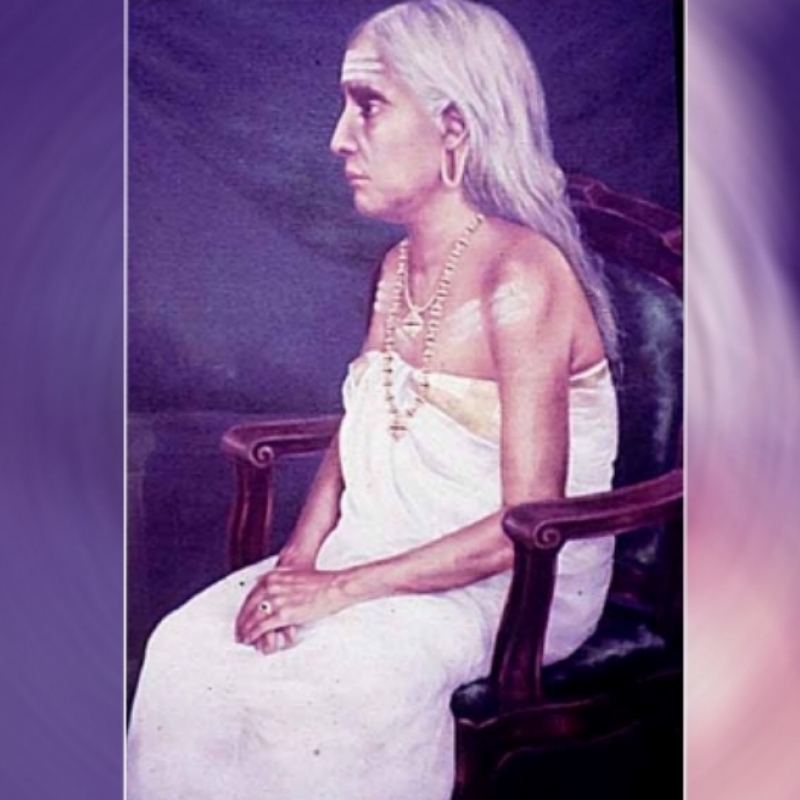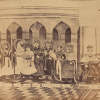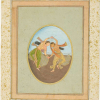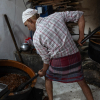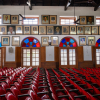In the nineteenth century, there was a generation of privileged women contributing to the traditional genres of Malayalam literature. Among them, Kuttykkunhu Thangkachi leads the list as the first dramatist and first-known female music composer from Kerala. While early historians may have tried to undermine her contributions as a capable homemaker and virtuous woman who managed to write poetry tolerable well, there is no denying her astonishing range of compositions in Carnatic music. We explore her life and works. (Photo courtesy: Wikimedia Commons)
Erudite royal women are no rarity in the literary history of the Malayalam language. In pre-modern Malayali society, belles-lettres were accessible to Kshatriya and upper-Shudra women. Besides the legends of such scholars and composers of literature of the eighteenth century as Kozhikode Manorama Thampuratti, the early literary histories of Malayalam written by scholars like Ulloor Parameswara Iyer and P. Govinda Pillai[1] mention such royal women as Ambadevi Thampuratti (1802–37), Ikkavamma Thampuran of Kochi (1842–1921), Kilimanoor Umadevi Thampuratti (1787–1836) and Thiruvithamkoor Nagercoil Ammachi (1839–1909) as composers in traditional genres such as champu (a mix of prose and verse), paana (folk music), kilippaattu (a poem where the narrator is an animal/bird) and so on.[2] These compositions were themselves evidence for their grasp of Malayalam and Sanskrit, and the literary conventions of these languages—though they were considered marginal presences in the field of pre-modern literary composition by later-day historians of literature.
Also read | Mothers, Lovers & Others: A study of the Chausathi Yogini Temple in Hirapur
However, one name that is usually mentioned more often when speaking of early female Malayali composers is that of Kuttykkunhu Thangkachi (not Kutti Kunju Thangkachi as is popularly spelt). She was the first dramatist and first-known female music composer from Kerala. Kuttykkunhu Thangkachi—Kuttykkunhu was a pet name for Lakshmi Pilla—was born in south Travancore on February 14, 1820, into a family closely connected with the royal family of Travancore. She lived most of her life in Thiruvananthapuram, in an atmosphere suffused with exciting experiments in the arts, music, dance and literature during the reign of Raja Swathi Thirunal Rama Varma (1813–46). Her father Ravi Varma Thampi—better known in Malayalam as Irayimman Thampi (1782–1856)—was one of the most illustrious composers and musicians of the time. Young Lakshmi received an education in Malayalam, Tamil and Sanskrit, which continued after her marriage to a close relative of her father at the age of 14. Her training in music and poetry began after, and much of it was conducted by her father himself. It is also said that she gained great proficiency in the Thiruvathirakali dance form that Malayali women performed in their homes. The fact that she authored three major libretti (text used in or intended for an extended musical work such as an opera, musical, etc.) for Kathakali—called aattakatha in Malayalam—which are being explored by performers now,[3] also indicates that she had an excellent grasp over the Kathakali form.
Dr Omana Kutty singing a composition by Kuttykkunhu Thangkachi
Not Just Her Father’s Daughter
Literary historians claim that her father did not encourage her ambitions initially, but later, he seems to have become an active mentor. He presented her work to the Maharaja of Travancore, Uthram Thirunal, who rewarded her richly for her compositions. He is said to have had a major role in encouraging her to write the work that won the most accolades—the aattakatha titled Sreemathy Swayamvaram. He is remembered as both father and guru in the conventional acknowledgment of the guru in some of her major works—Sreemathi Swayamvaram, Parvathi Swayamvaram and Mithrasaha Moksham.
There is the question why Kuttykkunhu Thangkachi was remembered while many of her peers, mentioned above, are scarcely mentioned in standard accounts of Malayalam literature. In other words, there is clearly a generation of privileged women contributing to the traditional genres of Malayalam literature in the nineteenth century, but they are not remembered as a generation. It is true that women’s writing that represented a transitional phase—between traditional genres and modern ones—such as Tottaikkattu Ikkavu Amma’s play Subhadrarjunam (1891)[4] has better visibility, but Thangkachi was hardly counted as a member of this group, at least by early literary historians of Malayalam literature. So, was Thangkachi noticed better because she was the daughter of a brilliant member of Swathi Thirunal’s court? Did she bask in her father’s glory?
The answer to this question will have to start with noting, at the outset, that the early literary historians do not reduce Thangkachi to her father’s daughter. However, the approbation of early literary historians of Thangkachi as a literary author was not unambiguous. They do not grant her a full literary persona; rather, their praise invariably stresses the fact that she was a capable homemaker (she was married twice as was normal in matrilineal families back then) and virtuous woman who managed to write poetry tolerably well.

An Astonishing Range
A more convincing response would point out that Thangkachi’s uniqueness was that her literary career spanned the period of transition from pre-modern to modern literature. More importantly, perhaps, Thangkachi contributions are of an astonishing range. They range from genres of high-literary composition, including the kilippaattu, paana, aattakatha, thullal (a kind of comedic dance and story-telling), sthalapuranas (describing sites and temples), manipravalakavya (poetry in an admixture of Malayalam and Sanskrit), and the more popular forms such as prayer songs, tiruvatira dance-songs, swing-songs (oonjhaalppattukal) and kurathippattu (wedding songs), besides her many much-admired musical compositions. She is even credited with a vathilthurappattu in the genre of wedding-songs, which are often thought lurid or lewd and incorporate rustic usages, by the dancer-scholar Deepti Omchery-Bhalla.[5] Some of her contributions are considered the best available in the genre—for example, according to the early literary historians, her Kiratham kurathippattu, among the kurathipattu works in Malayalam. In other words, it was not possible to bracket her as just another privileged woman who dabbles with letters despite efforts to do so.
Also read | Legacy of Veena Dhanammal: In Conversation with Ritha Rajan
Added to this is the fact that she does belong to the transitional generation mentioned earlier. This is evident from her play, believed to be the first by a woman in Malayalam, Ajnathavasam (Life Incognito, 1890), which is based on the Mahabharata but touches upon topics of immense interest among the modern educated new elites of the late nineteenth century. In the opening sequence, for instance, the nati (female co-narrator) suggests to the sutradhar (narrator) that they enact the play Ajnathavasam to enthral the audience. In response, the sutradhar throws her a question: ‘Is not this choice of a woman’s play when there are indeed many available penned by illustrious [male] poets, an expression of your pride as a woman?’ Nati dismisses this doubt as ‘ill-intentioned’ and points to him that they need to consider only the ‘artistic ability visible in the play.’ The sutradhar then joins her, remarking that ‘this will open up a way to create interest in poetic creation among other women as well.’[6]
In sum, Kuttykkunhu Thangkachi’s achievements were in diverse fields, and within fields, in many diverse genres, so much so that she could not be erased so readily from historical memory as ‘just a housewife who composed’. Also, her work carries in it the indelible traces of the enormous transformation of Malayalam literature and its readership in the nineteenth century in which literature became a vehicle of contemporary concerns addressing a modern liberal literary public. There is every reason, then, to think that her glory was hers alone.
This article was also published on FeminisminIndia.com
Notes
[1] P. Govinda Pillai, Malayalabhashacharithram, 1881; Ulloor S. Parameswara Iyer, Malayala Sahitya Charithram 1949.
[2] Champu refers to a composition in which verse and prose are admixed; kilippaattu is a poem in which the narrator is placed outside the human world—usually imagined to be a bird (kili); paana refers to songs written to the rhythmic meter of the same name, probably derived from folk music.
[3] K. Santhosh, ‘Breathing Life into Kutty Kunju Thankachi’s Play’, The Hindu, April 21, 2015. Accessed February 4, 2021. https://www.thehindu.com/news/national/kerala/breathing-life-into-kutti-kunju-thankachis-play/article7124554.ece .
[4] See for more details, Nisha M., ‘Making a Foray into the Uninhabited Grounds of Writing: Thottaikkat Ikkavamma’s Subhadrarjunam’, Literary Miscellany 4, 2, 2015.
[5] Harisankar, ‘Deepti Omchery-Bhalla – The Quest for Enriching Mohiniattom’, Narthaki, July 15, 2020. Accessed February 4, 2021. https://narthaki.com/info/rev20/rev2522.html.
[6] Kuttykkunhu Thangkachi, ‘Ajnatavasam’, in Kuttykkunhu Tangkachiyude Krithikal (Thrissur, 1979), 239–40.
